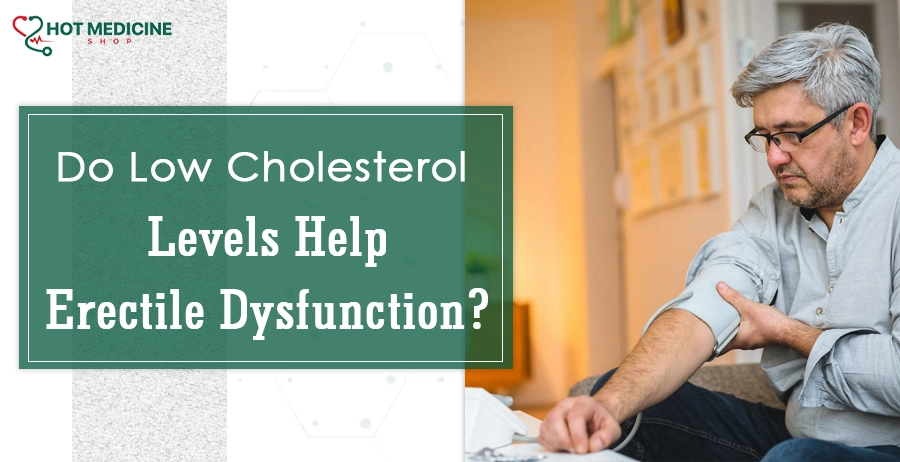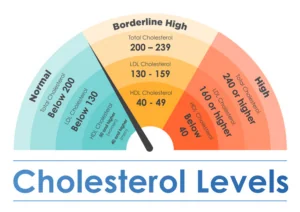Do Low Cholesterol Levels Help Erectile Dysfunction?

Erectile dysfunction is a common and distressing condition that affects many men worldwide, impacting their sexual health and overall quality of life. While numerous factors contribute to ED, recent research has explored the link between low cholesterol levels and erectile dysfunction.
Do Low Cholesterol Levels Help Erectile Dysfunction? This article aims to delve into the intricate relationship between cholesterol, testosterone, and erectile function, examining whether maintaining low cholesterol levels could potentially aid in preventing or managing ED.
⚤ Understanding Erectile Dysfunction
Before delving into the cholesterol-ED connection, it is crucial to understand what erectile dysfunction is and how it manifests. Erectile dysfunction, often referred to as impotence, is the consistent inability to achieve or maintain an erection sufficient for sexual intercourse.
Various factors contribute to this condition, including psychological issues, hormonal imbalances, vascular problems, and lifestyle factors such as smoking and excessive alcohol consumption. High cholesterol is one of the main causes of erectile dysfunction. can build up and clog the arteries, making it difficult for blood to flow to the penis and causing erectile dysfunction.
🎚️ Does Low Testosterone Increase Cholesterol Levels?
Testosterone, a key male sex hormone, plays a pivotal role in maintaining sexual health and function. Recent studies have suggested a reciprocal relationship between testosterone levels and cholesterol. Low testosterone levels may contribute to increased cholesterol levels, particularly low-density lipoprotein (LDL) or “bad” cholesterol.
Research has shown that testosterone deficiency can lead to alterations in lipid metabolism, resulting in elevated cholesterol levels. This imbalance not only affects cardiovascular health but may also have implications for sexual function.
Understanding this interplay between testosterone and cholesterol is essential in exploring potential interventions for erectile dysfunction. Research has found that testosterone therapy can help reduce cholesterol levels and improve erectile function. Therefore, testosterone therapy may be a viable option for men who are struggling with erectile dysfunction. Cenforce 150 mg works to strengthen and prolong erections, revitalizing your sexual performance.
🌡How Cholesterol Affects Your Health?
Cholesterol is a waxy, fat-like substance that is essential for the production of hormones, vitamin D, and the building of cell membranes. However, excess, especially LDL cholesterol, can accumulate in the arteries, forming plaques that narrow and obstruct blood flow. This process, known as atherosclerosis, can have severe implications for cardiovascular health.
Atherosclerosis affects the arteries supplying the heart and those leading to the pelvic region, including those responsible for blood flow to the genitals. Reduced blood flow to the penis is a common cause of erectile dysfunction. Consequently, maintaining optimal cholesterol levels is crucial for overall cardiovascular health and may indirectly influence sexual function. Fildena 100 mg restores confidence with a robust, lasting erection that enhances sexual performance for men with erectile dysfunction.
🌡️ Low Testosterone Treatment May Help Reduce Cholesterol
Recognizing the potential link between low testosterone, elevated, and erectile dysfunction has prompted researchers to explore whether testosterone replacement therapy (TRT) could have a positive impact on cholesterol levels. Testosterone influences lipid metabolism, and its deficiency has been associated with unfavorable profile changes.

Several studies have indicated that testosterone replacement therapy may reduce total cholesterol levels, particularly 🩸 LDL cholesterol. This suggests that addressing testosterone deficiency not only benefits sexual health but may also contribute to improved cardiovascular outcomes by regulating cholesterol levels.
It is important to note that while TRT shows promise in improving cholesterol profiles, healthcare professionals should carefully monitor its use. Testosterone replacement therapy is not without potential risks and side effects, and its suitability for an individual should be assessed based on a thorough medical evaluation. Take Vidalista 60 mg to experience passion and intimacy again for long-lasting and dependable erections.
⚕️ Treatment Options
Addressing erectile dysfunction involves a comprehensive approach that considers various factors contributing to the condition. While the potential role of testosterone in ED is intriguing, it is crucial to recognize that effective management often requires a combination of interventions. Here are some treatment options for erectile dysfunction:
➡ Lifestyle modifications:
A healthy lifestyle can positively impact cardiovascular health and sexual function. Regular exercise, a balanced diet, and avoiding smoking and excessive alcohol consumption contribute to overall well-being and may improve erectile function. Additionally, managing stress, getting enough sleep, and engaging in regular sexual activity can all help to reduce erectile dysfunction.
➡ Medications:
Several oral medications, such as phosphodiesterase type 5 (PDE5) inhibitors, are commonly prescribed to treat erectile dysfunction. These medications enhance blood flow to the penis, facilitating the achievement and maintenance of erections.
➡ Hormone therapy:
In cases where testosterone deficiency is identified, hormone replacement therapy may be considered under the guidance of a healthcare professional. However, such therapy’s potential risks and benefits should be carefully evaluated. Hormone therapy should only be prescribed after a thorough medical evaluation. The benefits of hormone therapy should be weighed against the potential risks, such as an increased risk of certain types of cancer. Periodic monitoring of hormone levels and side effects should be done.
➡ Psychological counseling:
Erectile dysfunction can often have psychological roots, such as stress, anxiety, or depression. Counseling and psychotherapy may be beneficial in addressing these underlying issues and improving sexual function. It is important to address any psychological issues that may be contributing to erectile dysfunction. Working with a therapist can help to develop coping strategies, reduce stress, and improve overall well-being. This can help to improve erectile function.
Vacuum erection devices and surgery: In some cases, mechanical devices or surgical interventions may be recommended to address physical causes of erectile dysfunction, such as vascular abnormalities.
👇 Bottom Line
While the relationship between low cholesterol levels and erectile dysfunction is an intriguing area of research, it is essential to approach the topic with a nuanced perspective. Maintaining optimal cholesterol levels is crucial for overall cardiovascular health, and addressing testosterone deficiency may offer benefits beyond sexual function.
However, the complexity of erectile dysfunction requires a multifaceted approach that considers the interplay of psychological, hormonal, and vascular factors. Men experiencing symptoms of ED should seek the guidance of healthcare professionals who can conduct a thorough evaluation and tailor a treatment plan to address their specific needs.
Ultimately, the quest for better sexual health involves a holistic approach that encompasses lifestyle modifications, medical interventions, and a proactive attitude toward overall well-being.


